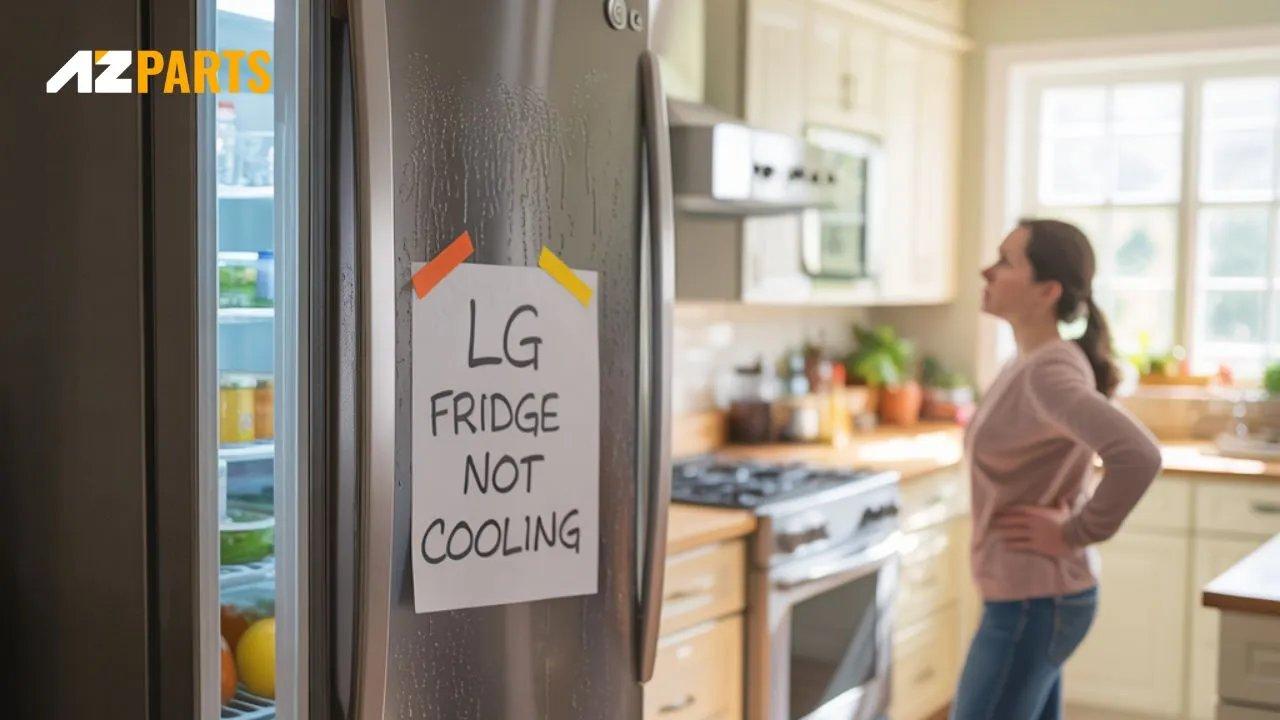Repair help
Why Is My Refrigerator Compressor Hot? Causes & Fixes
AZparts Team
Updated on July 30, 2025
5 min read
The compressor is a vital component of the refrigerator cooling system, responsible for maintaining a stable temperature to preserve food. During use, many users notice that the compressor becomes unusually hot without understanding the reason. This could be a warning sign of potential problems that may affect the cooling performance and lifespan of the appliance. The article below will help you understand why the refrigerator compressor gets hot, common causes of this issue, and effective solutions including replacing faulty parts with suitable components from AZParts.

1. How Does a Refrigerator Compressor Work?
The refrigerator compressor, also known as the fridge block, is a crucial part of the cooling system. It functions by drawing in and compressing the refrigerant, then pushing it into the evaporator coils to maintain a stable internal temperature. Simply put, the compressor generates a continuous flow of cold air, allowing the fridge to keep food fresh for a long time.
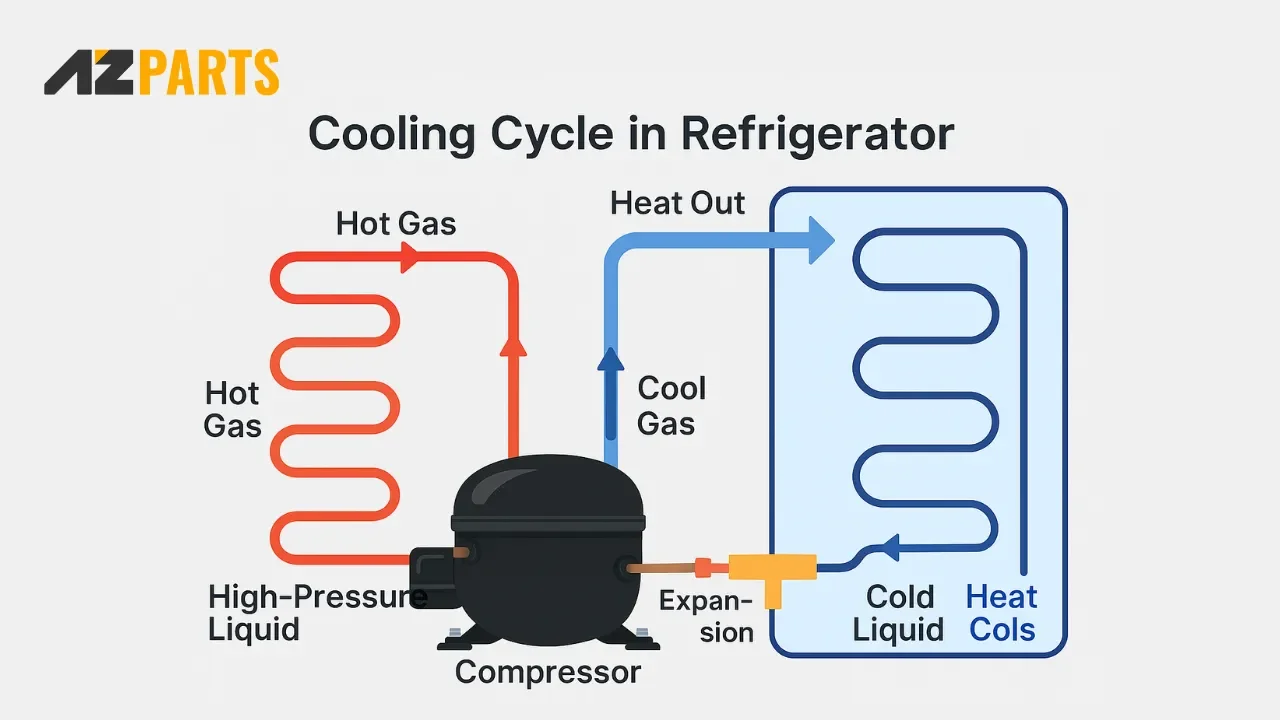
The refrigerator compressor is a crucial part of the cooling system (Source: AZParts)
The cooling cycle includes four main stages:
Step 1: Compression
The compressor pulls in low-pressure, low-temperature refrigerant gas from the evaporator coil. It then compresses the gas, increasing both its pressure and temperature. As a result, the refrigerant turns into a high-pressure, high-temperature gas. This gas is then sent to the condenser coil for the next stage.
Step 2: Condensation
The hot, high-pressure gas enters the condenser, usually located at the back of the fridge. Here, the refrigerant releases heat to the surrounding environment through pipes and metal fins. As it loses heat, the gas condenses into a high-pressure liquid. This is the phase where the refrigerant changes from gas to liquid through heat dissipation.
Step 3: Expansion
The high-pressure liquid passes through an expansion valve or capillary tube. As it flows through this part, the pressure drops suddenly, leading to a decrease in temperature. The refrigerant now becomes a low-pressure, low-temperature mixture of liquid and gas, ready for the evaporation process.
Step 4: Evaporation
The cold refrigerant enters the evaporator coil inside the fridge. Here, it absorbs heat from the air inside the refrigerator. As it takes in heat, the refrigerant fully evaporates into gas. This heat absorption cools the air inside the fridge, preserving the food. The cold gas then returns to the compressor, starting a new cycle.
This cycle runs continuously, powered by the compressor, to keep the fridge at a stable temperature. The compressor is the core component that drives the entire refrigeration process.
2. Should the refrigerator compressor be hot?
Under normal operating conditions, the compressor may feel slightly warm due to the heat generated during gas compression. However, if it becomes too hot to touch or the refrigerator is no longer cooling effectively, this could be a sign of an abnormal issue.
2.1. Electrical Issues
Parts such as the relay & overload and refrigerator overload protector help regulate the electrical current and prevent the compressor from overworking. If these components fail, the compressor may stay in continuous operation, causing it to overheat.
You can replace faulty parts like the overload protector and relay with products from AZParts. These components are designed to ensure stable compressor function and are compatible with many popular refrigerator models. Using the correct refrigerator relay and overload assembly can help reduce the risk of overheating due to electrical faults.
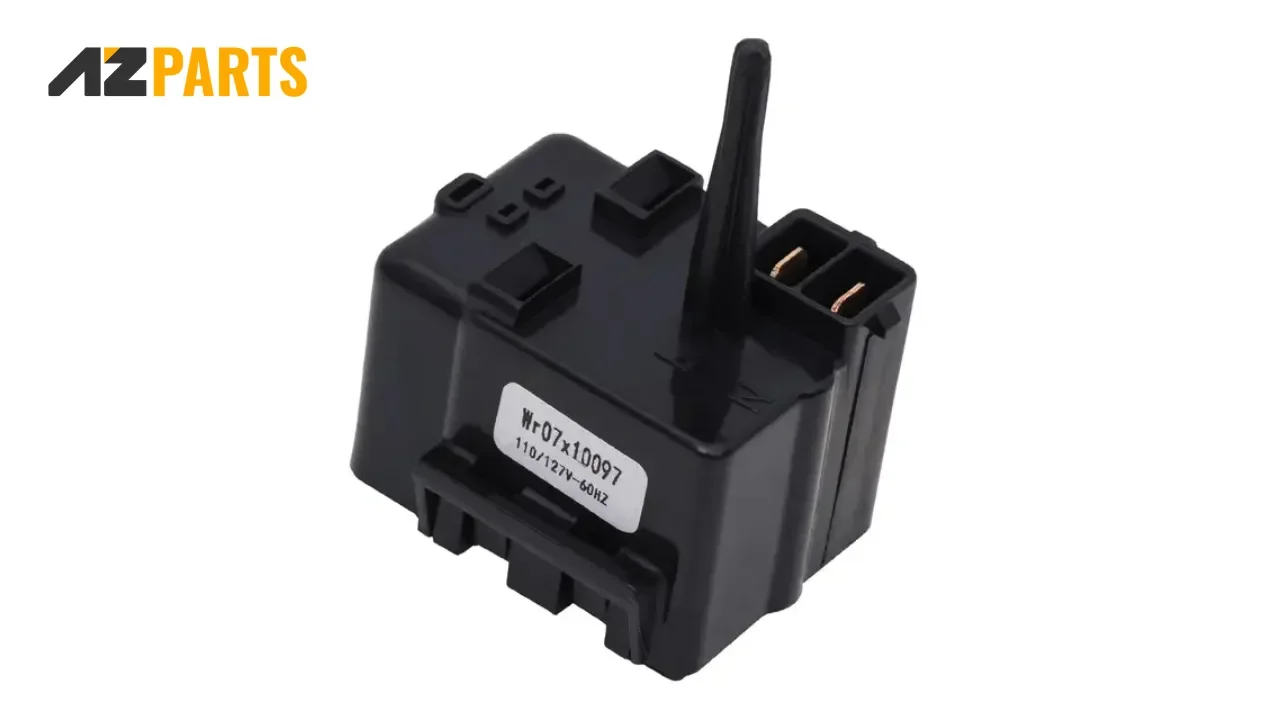
Relay & overload and overload protector help regulate the electrical current and prevent the compressor from overworking (Source: AZParts)
2.2. Faulty Start Relay Or Capacitor
The start relay and capacitor help the compressor start correctly. If either of these components is damaged, the compressor may fail to start or start improperly, leading to inefficient operation and overheating.
AZParts offers compatible start relays and refrigerator capacitors for most refrigerator compressors. Replacing them promptly is an effective way to restore normal operation and prevent overheating.
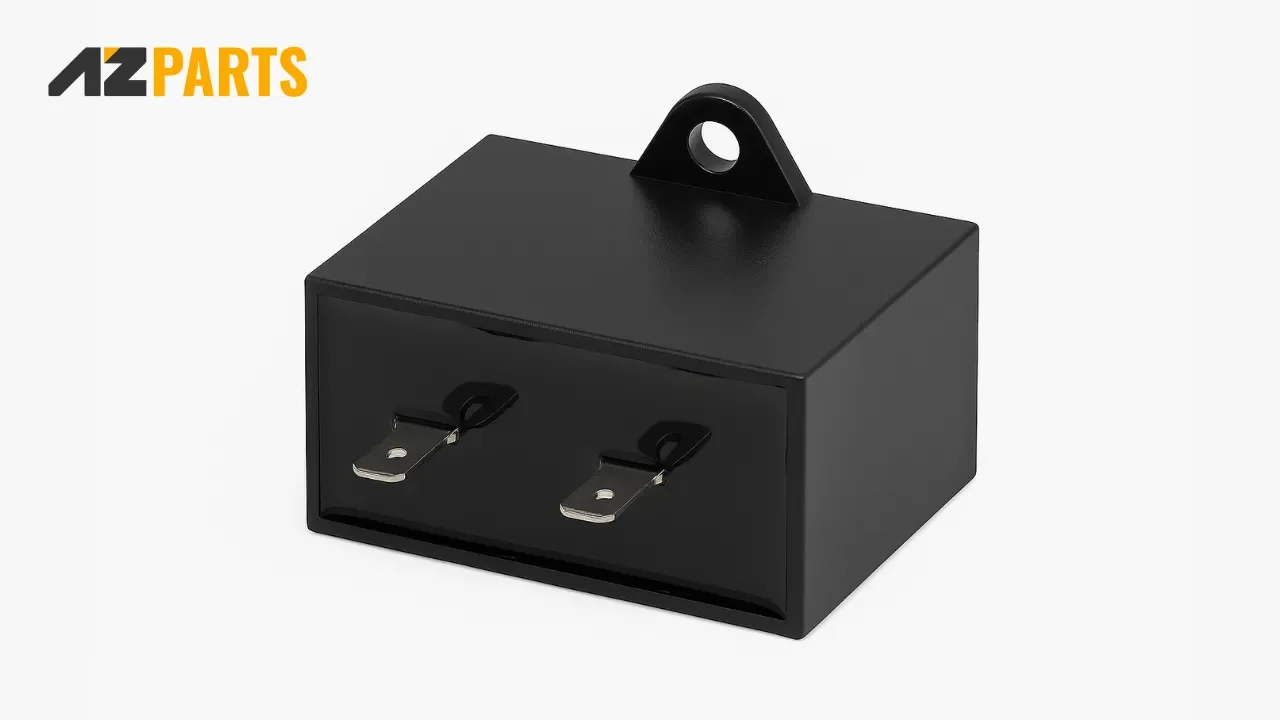
AZParts offers compatible start relays and capacitors for most refrigerator compressors (Source: AZParts)
2.3. Blocked Or Dirty Condenser Coils
When the condenser coils accumulate dust and dirt, their ability to release heat is reduced. This forces the compressor to work harder and longer, increasing its temperature. Regular cleaning with a soft brush or vacuum cleaner is important to maintain efficiency.
2.4. Malfunctioning Fan
The cooling fan near the condenser helps release heat into the surrounding air. If the fan is broken or the control board fails, cooling is interrupted and the compressor becomes hot.
In this case, you can inspect and replace the fan refrigerator motor or refrigerator control board with parts from AZParts. These components are designed to restore cooling function and help prevent overheating.
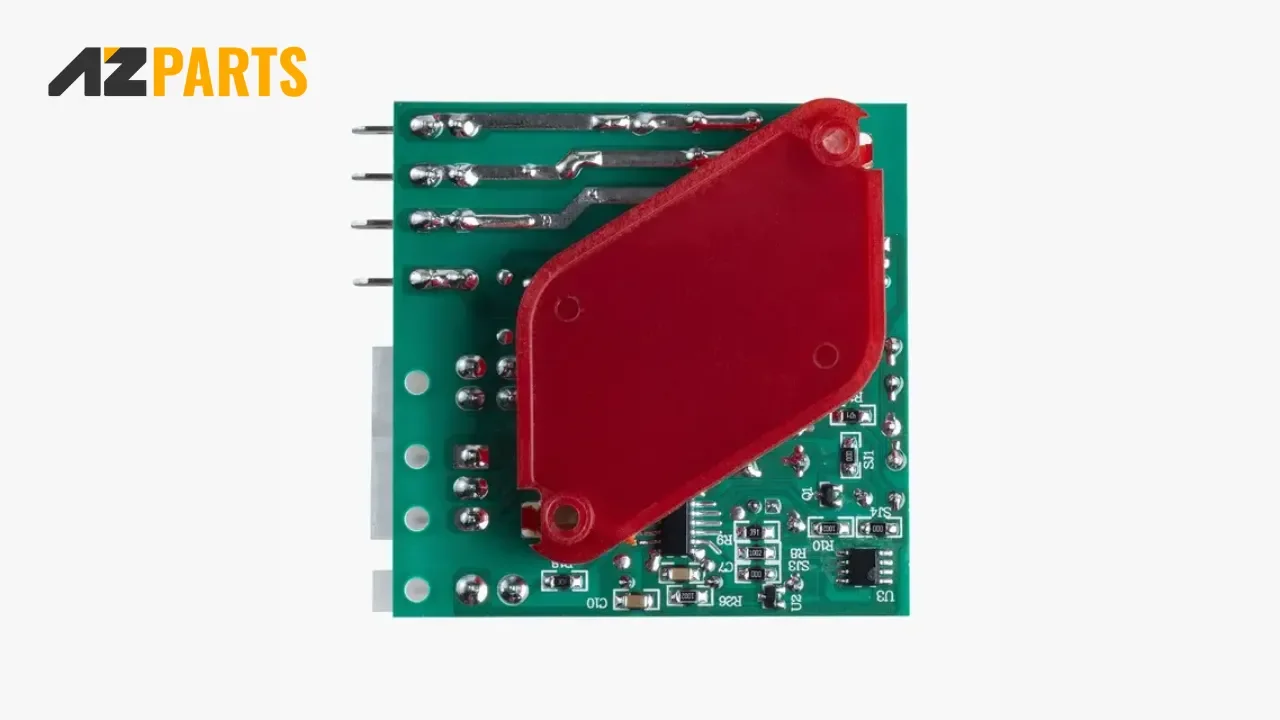
Replace the fan motor or control board also help prevent overheating (Source: AZParts)
2.5. Poor Ventilation Around the Unit
If the refrigerator is placed too close to the wall or in a tight and enclosed space, heat cannot dissipate effectively. This makes the compressor work harder to maintain temperature and may cause it to overheat. Make sure to leave at least 10 centimeters of space between the fridge and nearby walls.
2.6. Low Refrigerant Or Gas Leak
When the refrigerant level is low due to leakage or natural loss over time, the compressor needs to run continuously to make up for reduced cooling. This constant operation leads to overheating. In this case, inspect the tubing system, refill refrigerant if needed, and repair any leaks found.
An overheating refrigerator compressor is a warning sign that the cooling system may be experiencing issues such as faulty electrical components, a weak cooling fan, dirty condenser coils, or low refrigerant levels. To fix the problem effectively, you should inspect and replace parts like the relay, capacitor, overload protector, condenser fan, or control board. Using refrigerator parts from AZParts ensures compatibility, reliable quality, and helps extend the lifespan of both the compressor and the entire refrigerator.
Learn more about other refrigerator's problems that you might encounter:
Contact Info
Address: 8 The Green, Ste A, Dover, Delaware 19901-3618, United States
Email: support@azparts.com
Refrigerator
Further Reading
Further Reading

